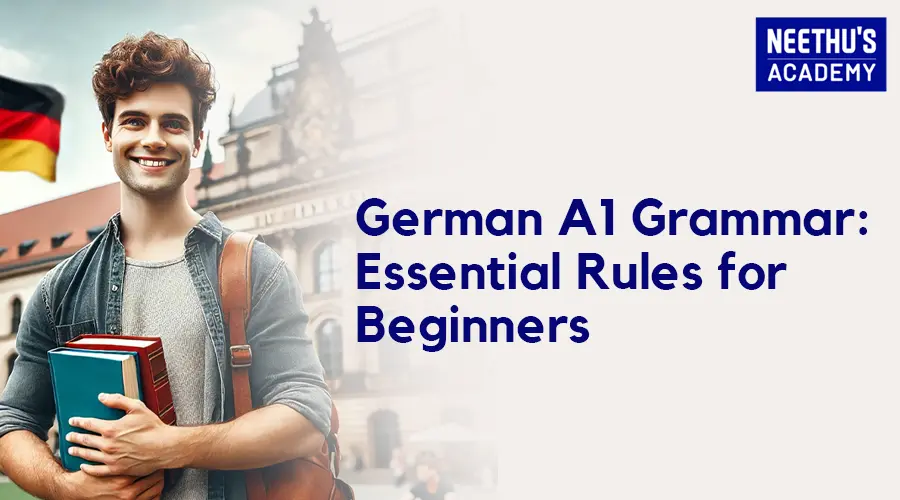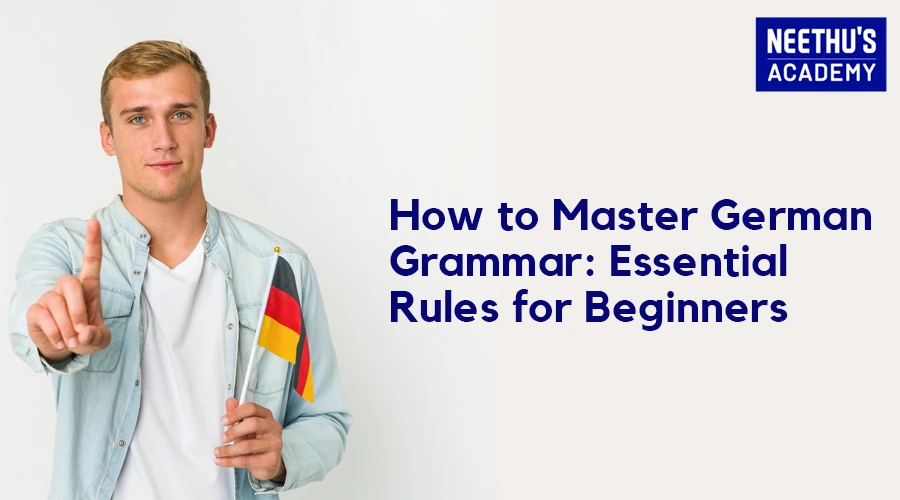German A1 Grammar Rules: Essential Guide for Beginners
When learning German on the A1 level, the basics of grammar are essential; at this level, you know all those essentials necessary to build simple sentences, and questions or even start to engage in basic conversations. German A1 grammar will thus endow the skills for navigating everyday situations, such as being able to introduce yourself, speak about hobbies, or ask for directions. The understanding of grammar is not just recalling rules but also applying them so you will have to combine theory with actual usage. In this blog, we’ll explore German A1 grammar in detail, give you some useful tips, and help you avoid some common mistakes. So, dive in!
Overview of German A1 Grammar
The German A1 grammar contains the basic structure elements of sentence building, verb conjugation, noun gender, and questioning. Here, you’ll learn simple sentences and questions while becoming familiar with the three grammatical genders and various verb conjugations in German. Most importantly, you will gain a basic understanding of how language is structured overall and how the words go together.
At A1, grammar is simplified for you to understand the basics of rules that act as a foundation to complete more complex language skills at higher levels. Understanding the basic German grammar for beginners helps set up you for success as you progress.
Key German A1 Grammar Rules
Basic Word Order in Sentences
German A1 grammar presents the classic subject-verb-object (SVO) sentence order. However, the order of sentences relaxes a little as one progresses in the learning process. For A1, you must follow the SVO structure, and besides that, you encounter rules that modify the sequence when asking questions or making use of modal verbs to construct a sentence.
For example,
Simple sentence: Ich lerne Deutsch (I am learning German).
Question: Lernst du Deutsch? Do you learn German?
When more complex sentences use subordinating conjunctions, the verb is shifted to the end of the clause:
Ich denke, dass du Deutsch lernst (I think that you are learning German).
Knowing these subtleties early on can equip you to create correct sentences more quickly.
Noun Gender and Articles
German nouns are divided into three genders: masculine, feminine, and neuter. For a newcomer learning German grammar, it is highly important to know the gendered articles for nouns. The definite articles are:
- Masculine: der
- Feminine: die
- Neuter: das
For example:
der Tisch (the table) – masculine
die Lampe (the lamp) – feminine
das Buch (the book) – neuter
The articles also differ in the plural form. Regardless of the noun’s gender, the plural article is die:
die Bücher (the books)
die Tische (the tables)
German language, also, has indefinite articles (ein, eine), like “a” or “an” in English. Knowing which noun takes which article can be tedious but necessary to get proper sentence formations.
Conjugating Verbs in Present Tense
Another rule of German A1 grammar to remember is the conjugation of verbs. While regular verbs do follow a predictable pattern in the present tense, they still contain a great amount of diversity. For example, the verb lernen, meaning to learn, is conjugated as follows:
- Ich lerne (I learn)
- Du lernst (You learn)
- Er / sie / es lernt (He / she / it learns)
- Wir lernen (We learn)
- Ihr lernt (You all learn)
- sie lernen (They learn)
- Sie lernen (You learn)
Knowing the conjugations for both regular and irregular verbs will allow you to describe actions succinctly in German.
Personal Pronouns
In German, personal pronouns vary according to grammatical case: nominative, accusative, and dative. You will use the nominative pronoun nearly all the time at A1:
- Ich: I
- Du: you(informal)
- Er/sie/es: he/she/it
- Wir: we
- Ihr: you(plural)
- sie: they
- Sie: You(formal)
It is helpful to keep in mind that German has both a formal and informal “you.” It uses ‘du’ with friends and on casual occasions but ‘Sie’ with your elder or more formal situations. This is one thing that you will want to remember when discussing both personal and professional interests.
Forming Questions
Forming questions is one of the key features of communication. In German A1 grammar, questions could be formed in a similar way as in English, that is by switching positions of the subject and verb:
- Du lernst Deutsch. You are learning German.
- Lernst du Deutsch? (Are you learning German?)
Alternatively, use question words such as was (what), wie (how), wo (where), etc. to make more specific questions:
- Was machst du? (What are you doing?)
- Wo wohnst du? Where do you live?
The word order for questions is something a person would need to master in order to be conversationally fluent in German.
Common Mistakes and How to Avoid Them
Incorrect Article Usage
Many learners have difficulties with using the correct article (der, die, das) on nouns. The most commonly made error in A1 German grammar is selecting the wrong article. Avoid this by learning the article at the same time that you learn the noun. Flashcards are great particularly if you include both nouns and gender.
Misplacing Verbs in Sentences
In sentences with subordinating conjunctions or questions, beginners often make a mistake in verb placement. Never forget that in the main clause, the verb comes second, but in the subordinate clause, it comes in at the end:
Main clause: Ich gehe ins Kino (I am going to the cinema).
Subordinate clause: Ich denke, dass ich ins Kino gehe (I think that I am going to the cinema).
Forgetting to Conjugate Verbs
Another common mistake is forgetting to conjugate verbs according to the subject of the sentence. Also, make sure the verb is always in agreement with its subject and that there is a variation of pronouns used, especially:
Ich gehe (I go) vs. Du gehst (You go).
To prevent this, practice verb conjugation tables of common verbs regularly.
Quick Tips to Master German A1 Grammar
Practice with Common Verbs and Vocabulary
Keep a list of common verbs, their conjugations, and key vocabulary words. Practice on the simplest of sentences so that your foundation of German grammar is built. Periodic review of these will help you familiarize yourself with the basics of German grammar.
Use Flashcards for Gendered Nouns
Flash cards come in handy for memorizing the gender of something that’s always relevant to mastering German A1 grammar rules. You could color codes too, for example; blue for masculine, pink for feminine, and yellow for neuter.
Engage with Real-Life German Content
Watch German videos, listen to German podcasts, or read simple texts that are targeted at beginners. In this way, you will see how the grammar rules apply in real contexts. You can begin with A1-level content and slowly increase your grammar level.
Write Simple Sentences Every Day
One way of learning A1 grammar in German is to write short sentences daily. Try to include those newly learned rules, such as verb conjugation, articles, and word order. The more you do that, the more fluent you will become.
Conclusion
Mastering German A1 grammar is pretty much the foundation of the language. You can know key grammar rules and avoid most mistakes while speaking confidently at the A1 level. Practice is always important whether you write, speak, or use grammar exercises. Keep practicing every day, use helpful resources, and follow our German A1 grammar tips to enhance your experience. Mastering A1 grammar can unlock deeper understanding and fluency in German whether you pursue self-study or professional help from German language institutes.
Frequently Asked Questions





